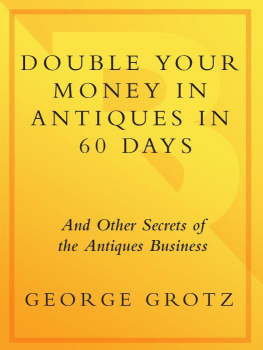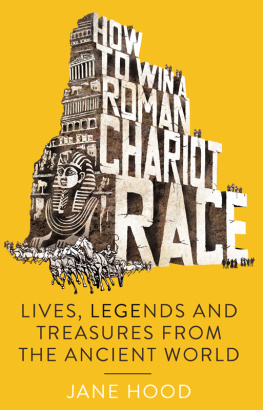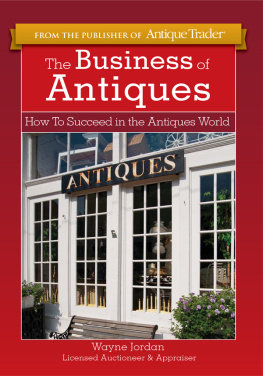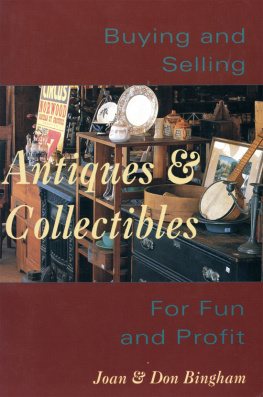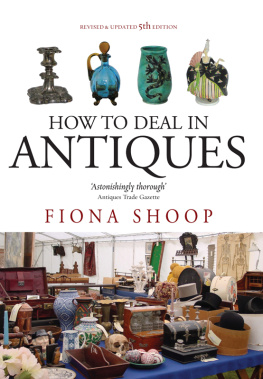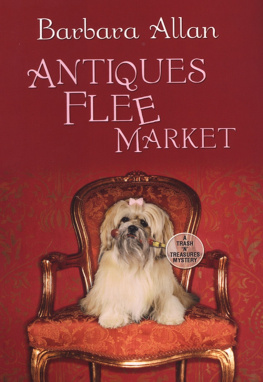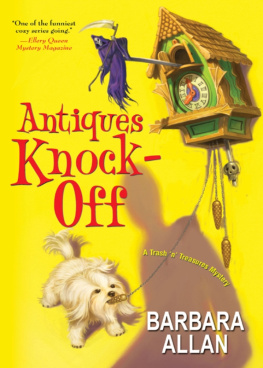George Grotz - Double Your Money in Antiques
Here you can read online George Grotz - Double Your Money in Antiques full text of the book (entire story) in english for free. Download pdf and epub, get meaning, cover and reviews about this ebook. year: 1986, publisher: Main Street Books, genre: Detective and thriller. Description of the work, (preface) as well as reviews are available. Best literature library LitArk.com created for fans of good reading and offers a wide selection of genres:
Romance novel
Science fiction
Adventure
Detective
Science
History
Home and family
Prose
Art
Politics
Computer
Non-fiction
Religion
Business
Children
Humor
Choose a favorite category and find really read worthwhile books. Enjoy immersion in the world of imagination, feel the emotions of the characters or learn something new for yourself, make an fascinating discovery.
- Book:Double Your Money in Antiques
- Author:
- Publisher:Main Street Books
- Genre:
- Year:1986
- Rating:3 / 5
- Favourites:Add to favourites
- Your mark:
- 60
- 1
- 2
- 3
- 4
- 5
Double Your Money in Antiques: summary, description and annotation
We offer to read an annotation, description, summary or preface (depends on what the author of the book "Double Your Money in Antiques" wrote himself). If you haven't found the necessary information about the book — write in the comments, we will try to find it.
Double Your Money in Antiques — read online for free the complete book (whole text) full work
Below is the text of the book, divided by pages. System saving the place of the last page read, allows you to conveniently read the book "Double Your Money in Antiques" online for free, without having to search again every time where you left off. Put a bookmark, and you can go to the page where you finished reading at any time.
Font size:
Interval:
Bookmark:
Books by George Grotz:
FROM GUNK TO GLOW
THE FURNITURE DOCTOR
THE NEW ANTIQUES
ANTIQUES YOU CAN DECORATE WITH
INSTANT FURNITURE REFINISHING
STAINING AND REFINISHING UNFINISHED FURNITURE AND OTHER NAKED WOODS
DECORATING FURNITURE WITH A LITTLE CLASS
THE ANTIQUE RESTORERS HANDBOOK
THE CURRENT ANTIQUE FURNITURE STYLE & PRICE GUIDE
THE FUN OF REFINISHING FURNITURE
GROTZS 2ND ANTIQUE FURNITURE STYLE & PRICE GUIDE
GROTZS DECORATIVE COLLECTIBLES PRICE GUIDE

PART I
How the Antiques Business Works
PART II
The 45 Fastest-selling Antiques that You Can Buy and Sell for a
Quick Profit
PART III
24 Things Not to Buy
THE DUMB AND THE RICH
Or, how to double your money in antiques
every sixty days as a full-time dealer
or just having fun on weekends
Do you really want to get rich in antiques? Or at least make some real money for a change? Well, then just listen to me because in the last thirty years Ive seen it all in the Wonderful World of Antiques. And one of the things that I have seen is that the vast majority of antique dealers are just plain dumb. And on the lower end of the scale some are even stupid. While at the top you have the few smart ones who make lots of money.
So over my years in this businessgetting rich writing, because I am not one of the vast majority of dumb writersI have been observing this phenomenon and figuring out what makes the difference between these three kinds of antique dealers. The stupid, who lose money. The vast majority of the dumb ones, who just make a few dollars once in a while. And the few rich ones, who know the secrets of how to double their money every sixty days. (Specifically, were talking about doubling about $10,000 every sixty days, and thats a yearly income of $60,000, which is rich enough for me. And we are talking about country-living dealers without any big-city shops. In fact, often with no shop at alljust a big station wagon and a small storage barn.)
How do they do it? By not being dumb, but smart. And the difference is that the dumb dealer is a romantic, and the smart dealer is a realist.
The romantic dealers think that antiques are swell. Interesting reminders of our cultural past. Quaint. Artistic. Sophisticated. Worth cataloging and knowing about in infinite detail. And worst of all, that everything that is antique is worth the time it takes to buy and sell it. Wow! Has the dumb romantic dealer got a wrong number.
The romantic dealer thinks that if he doubles his investment on interesting little objects in the $2-$5-$10-$15-$20 class he is making money. And he isnt. All he is doing is providing an interesting browsing experience for people who dont have much else to do.
The romantic dealer buys wicker chaise lounges painted white (Everybody loves them these days). When he could fit four much sought-after ladies desks in the same space and double six to eight times as much money. Hes a loserand he doesnt even know it. Or why.
But never again need you be a loser, Dear Reader, once you have learned all the secrets of the realistic dealers that are crammed into the following pages of this book.
Like what to buy. And where to buy. And when to sell. And where to sell. And all these secrets can be used by people who just want to have fun doubling their money on weekends going to auctions and flea markets, as well as people who want to run a full-time business with a big station wagon and a little storage barn.

And all this is real. Real and true. Because everything I write about, I have seen happen. And it is happening right now, and I can take you to the places where it is going on and show it to you.
Then why have I concealed the identities of these successful/realistic people who know how to make a lot of money in antiques? For two very good reasons. The first is that these people want no publicity at all except in the trade pressand not much therebecause their homes usually contain a fortune in the good stuff that they have skimmed off the surface of the things that have passed through their hands. And they are afraid of robbers, which are a very active bunch in the antiques business.
And the second reason is that there are a great many cash transactions in the fast-turnover part of the antiques business. And I guess Ill just let that one lie right there.
So if you want to become a better than average dealer, read onand pull yourself up into the world of reality by your own bootstraps.
Or if you are a newcomer and find yourself unexplainably attracted to this weird world of antiques and just have weekends available, stop wasting your time playing tennis and jogging and all those dumb things. First, read this true book about reality. And then get out in the Wonderful World of Antiques and double your money every sixty days. The way smart people do.
In the first section of this book, Im going to let you in on some of the truths and secrets Ive learned over the years. Good stuff on just what it takes to be a winner. Then after I tell you how, Im going to reveal to you with what. This is the real lowdown on the hottest items to buy and, equally as important, a no-no list of what not to touch.
HOW THE ANTIQUES
BUSINESS WORKS
the Harvard School of
Business Administration
Or, why people who dont pay attention
end up being poor all their lives
My wife doesnt like the title of this book. She says that nobody will believe me when I say that you can sell an antique for twice what you paid for it in only sixty days.
But thats not what I said!!!!!!
That would just be a lucky break, meaning youd have to be lucky to buy way below market value or sell way above market value, as at some turkey-shootwhich is what they call those summer auctions up in New England where they get all those rich city lawyers and doctors who come up on weekends to visit their rich city kids at camp.
What I am talking about is fast turnover of invested capital. And in this case we are talking about turning that capital over every two weeks, or four times in sixty days. Which means you need only make a 25 percent profit each time to have doubled your original investment in eight weeks or sixty days. And that is why we only buy the fastest-moving object that we can be sure of reselling in two weeks. Got it? Or do I have to send you to the Harvard School of Business Administration, too!
But, you say, I cant sell an antique in two weeks. And I say, the hell you cant! You could do it in four days if you moved fast enough back and forth between flea markets and antique dealers and got a little lucky about finding fast sellers, which you often can find even in one antique shop, and which you then dump off in the nexteven if only at a 10 percent profit.
Which brings up the point. What we are talking about is an average profit of 25 percent. If you make a mistake, and two dealers turn your object down at your 25 percent markup, dont hold out. Just see if you can unload it for what you paid for it right away. Money tied up in a nonseller will never make you any profit. You should even lose money on it if you have to in order to get your money into something else. And fast for that, too. And mark it up to experienceyou just found out about something you should never buy again. Turn over. Turnover. Thats the whole secret. And to tell you the truth, if I werent afraid of my little old wife, I would have called this book
Font size:
Interval:
Bookmark:
Similar books «Double Your Money in Antiques»
Look at similar books to Double Your Money in Antiques. We have selected literature similar in name and meaning in the hope of providing readers with more options to find new, interesting, not yet read works.
Discussion, reviews of the book Double Your Money in Antiques and just readers' own opinions. Leave your comments, write what you think about the work, its meaning or the main characters. Specify what exactly you liked and what you didn't like, and why you think so.

